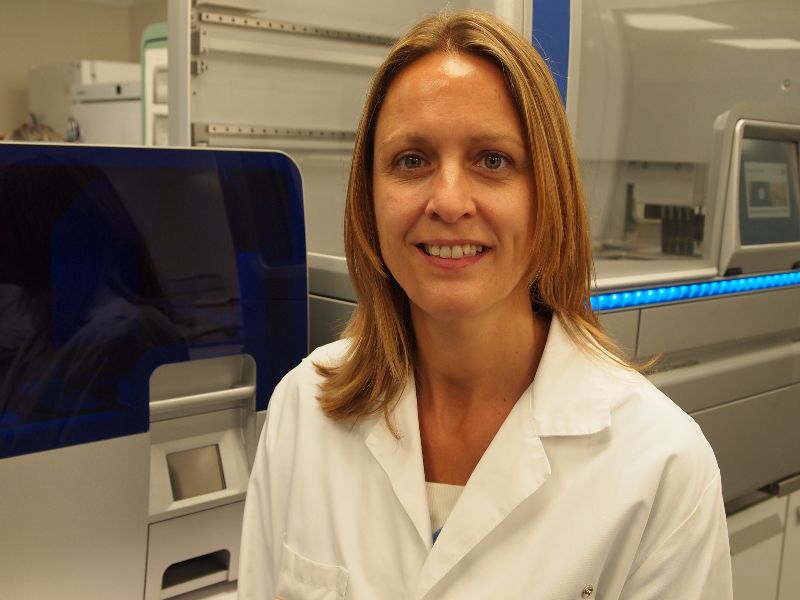
19/05/2021 - Press release
A study led by doctors from Hospital del Mar and researchers from the IMIM has demonstrated, for the first time, the usefulness of this technique for predicting poor prognosis in this type of patient prior to surgery
Liquid biopsy can predict which patients with localised rectal cancer are likely to relapse, even after initial chemotherapy and radiotherapy treatment, and prior to surgery. This is supported by a study led by doctors and researchers from the Medical Oncology and Pathology Departments at Hospital del Mar, as well as the Hospital de Mar Medical Research Institute (IMIM) and the CIBER in cancer (CIBERONC), which has been published in the American Association for Cancer Research journal, Clinical Cancer Research. The study analysed samples from 72 patients from twenty hospitals in Spain, taken as part of the GEMCAD1402 clinical trial conducted by the Spanish Multidisciplinary Group on Digestive Cancer.
Up to 30% of patients with locally advanced rectal cancer suffer a relapse and metastasis, despite having undergone chemotherapy, radiotherapy and surgery. The aim of the study now published was to determine the usefulness of the liquid biopsy technique, which detects DNA from tumour cells in the blood without the need to take tissue samples, in order to identify these patients. "This is a proof-of-concept study that, for the first time, demonstrates that liquid biopsy in locally advanced rectal cancer can be used as a prognostic factor in treatment decisions. This provides the basis on which we can set up a prospective clinical trial to analyse how to apply what we have discovered", says Dr. Clara Montagut, one of the authors of the study, head of the Digestive Oncology section in the Medical Oncology Service at Hospital del Mar and a researcher in the IMIM's Molecular Cancer Therapy Research Group.

Dr. Clara Montagut. Source: Hospital del Mar
Personalising the treatment
The researchers used a new liquid biopsy technique for the study, LUNAR-1, which expands the ability to detect genes from tumour cells to blood samples. This is the first time it has been used in rectal cancer. By using this method, it has been possible to determine that patients who have undergone the usual chemotherapy and radiotherapy treatment, who have not yet had surgery and who have tumour DNA in their blood, have a poor prognosis. The risk of relapse with metastasis, especially in the liver, is very high and the patient's life expectancy is much lower.
This has allowed the researchers to conclude that liquid biopsy has a high predictive and response value in this group of patients. This is highlighted by Dr. Joana Vidal, first author of the study, a consultant in the Medical Oncology Service and an IMIM researcher. "First, we had to demonstrate that we could find this circulating tumour DNA in patients with a localised tumour who had received specific treatment, such as chemotherapy and radiotherapy, before they underwent surgery. Then we had to validate that this had prognostic value in these patients. And we have managed to do it. The next step will be to design clinical trials that apply and improve the individual treatment in each patient."
The conclusions of the study point to the possible use of liquid biopsy for guiding and personalising patient treatment prior to surgery. "We propose a change in the treatment strategy, because these are patients for whom care should not focus solely on the tumour in the rectum, but also on the fact that in the near future there will be metastasis. So we need to be able to treat this metastatic disease before it appears", explains Dr. Vidal.
Rectal cancer
Together with colon cancer, rectal cancer is one of the most commonly diagnosed tumours in both men and women. Among younger patients (under the age of 50), the incidence of colon and rectal cancer increases by 2% each year. For this reason, they have some of the highest mortality rates, although the five-year survival rate is around 60%. The causes include genetic predisposition, smoking and other bad lifestyle habits. Early detection is essential for increasing patient survival, which is why the Colon and Rectal Cancer Early Detection Programme has already been running for more than ten years. Based on a stool sample, it can detect patients at risk of developing the disease and those who need to undergo tests to rule out or treat it at an early stage.
Reference article
Vidal J, Casadevall D, Bellosillo B, Pericay C, Garcia-Carbonero R, Losa F, Layos L, Alonso V, Capdevila J, Gallego J, Vera R, Salud A, Martin-Richard M, Nogué M, Cillán E, Maurel J, Faull I, Raymond V, Fernández-Martos C, Montagut C. Clinical Impact of Presurgery Circulating Tumor DNA after Total Neoadjuvant Treatment in Locally Advanced Rectal Cancer: A Biomarker Study from the GEMCAD 1402 Trial. Clin Cancer Res. 2021 Mar 16. doi: 10.1158/1078-0432.CCR-20-4769. Epub ahead of print. PMID: 33727257.
Servei de Comunicació:
Marta Calsina Freixas(ELIMINAR)
Tel:
(+34) 93 316 06 80
Doctor Aiguader, 88
08226 Barcelona
© Institut Hospital del Mar
d'Investigacions MèdiquesLegal Notice and Privacy Policy | Cookie Policy | Site Index | Accessibility | Find Us | Contact